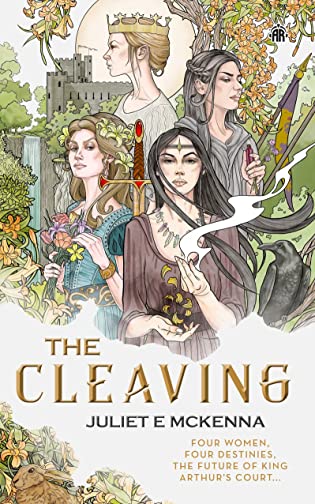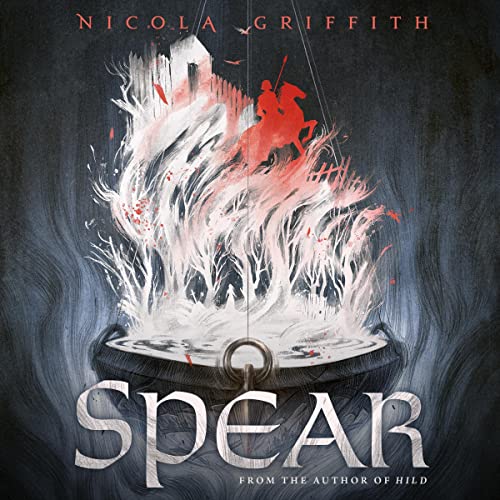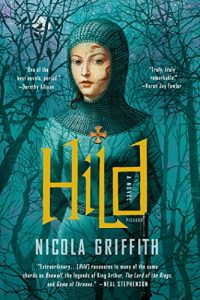 The Cleaving by Juliet E. McKenna
The Cleaving by Juliet E. McKenna Format: eARC
Source: supplied by publisher via Edelweiss
Formats available: paperback, ebook
Genres: Arthurian legends, fantasy, historical fantasy, retellings
Pages: 400
Published by Angry Robot on May 9, 2023
Purchasing Info: Author's Website, Publisher's Website, Amazon, Barnes & Noble, Kobo, Bookshop.org, Better World Books
Goodreads
Four women, four destinies – the future of King Arthur's court…
A new, feminist retelling of the Arthurian legends
The Cleaving is an Arthurian retelling that follows the tangled stories of four women: Nimue, Ygraine, Morgana, and Guinevere, as they fight to control their own destinies amid the wars and rivalries that will determine the destiny of Britain.
The legendary epics of King Arthur and Camelot don’t tell the whole story. Chroniclers say Arthur’s mother Ygraine married the man that killed her husband. They say that Arthur's half-sister Morgana turned to dark magic to defy him and Merlin. They say that the enchantress Nimue challenged Merlin and used her magic to outwit him. And that Arthur’s marriage to Guinevere ended in adultery, rebellion and bloodshed. So why did these women chose such dangerous paths?
As warfare and rivalries constantly challenge the king, Arthur and Merlin believe these women are destined to serve Camelot by doing as they are told. But men forget that women talk. Ygraine, Nimue, Morgana and Guinevere become friends and allies while the decisions that shape their lives are taken out of their hands. This is their untold story. Now these women have a voice.
Juliet McKenna is an expert on medieval history and warfare and brings this expertise as well as her skills as a fantasy writer to this epic standalone novel.
My Review:
The story (or legend, or myth, or history) of King Arthur and his knights of the Round Table is one of those “tales as old as time.” Whether one considers it a myth, or a legend, or a bit of fictionalized or fantasized history, there’s something about the story that speaks to generation after generation, and has since Sir Thomas Malory compiled his now-famous Le Morte d’Arthur back in the 15th century.
A compilation which was itself based on an earlier popular “history”, Geoffrey of Monmouth’s 12th century History of the Kings of Britain. All of the elements we now recognize as part of the Matter of Britain, King Arthur, Merlin, Guinevere, Lancelot, the castle at Tintagel, the sword Excalibur and his final rest in Avalon are all in that 12th century tale, just as they are in this 21st century reimagining, The Cleaving.
Some stories, and some characters, are so profoundly immortal that they must be reinterpreted for each generation and the story of King Arthur is one of those tales. Each generation has reinvented the “once and future king” for over EIGHT centuries so far.
There’s no sign of that stopping any time soon. Rather the reverse. The Cleaving, with its gritty medieval setting and its female-centered perspective on the deeds and misdeeds of the arrogant and autocratic and all-too-frequently abusive men they were supposed to serve and obey, shows the reader a somewhat more-plausible version of a story we all believe we know and love. The Cleaving tells another, rather different side to a legend and makes it all that much more “real” and even believable by that telling.
And it’s going to inform and inflect (or possibly infect) the next generation of tellers of this beloved tale. As it so very much should.
Escape Rating A+: The Cleaving is a compelling conundrum of a book. On the one hand, the story of King Arthur and his knights has been told, and retold, over and over, to the point where it forms one of the foundational tales of western literature along with a considerable number of the archetypes therein.
But very much on the other hand, in order to be considered a good book right now, The Cleaving has to be, and very much is, considerably more than merely a rehash of a story we already know. So it has the hard work of being a book where readers will already know how the story ends, while needing to tell its familiar story in a way that is fresh and new and will appeal to the audiences of its time and not just play on the nostalgia of those already familiar with the story.
The Cleaving succeeds in dancing on that very high and narrow tightrope by telling the story from the perspective of the women who usually exist as mere ciphers in its background while the men perform all the deeds of derring-do and conduct all the important business of their realms.
What The Cleaving does with the familiar story doesn’t change the story nearly as much as an earlier explicitly feminist and fantastically magical version – Marion Zimmer Bradley’s ultra popular The Mists of Avalon – did. Rather, The Cleaving takes that original story of men doing manly things and shows it from the perspective of a group of intelligent, influential women who performed as society forced them to in public – while maintaining their own thoughts and their own council behind the scenes.
It’s a portrait that feels more realistic to a 21st century reader without stretching the bounds of anachronism. These women were expected to manage complicated households, oversee large budgets for those households, keep everything running smoothly whether their lords were in residence or not – and even act in place of those lords when they were away – as many often were.
That level of intelligence and capability can’t be faked for very long at all without being found out. On the other hand, public subservience is easy to fake just by schooling one’s expressions and keeping one’s mouth shut except to be agreeable and above all, meek. It would require getting used to the sensation of swallowing one’s own tongue rather a lot, but it can be done. Especially in front of men who would be inclined to believe it anyway.
So in public they all seem meek, mild and accepting of the inevitable. Because the abuse they suffered, whether physical or emotional, was inevitable. Their choices were few. But in private, they mitigated what damage they could. Even if it wasn’t nearly enough.
So Uther, with Merlin’s connivance, rapes Ygraine while wearing her beloved husband’s face. With Merlin’s connivance, the child of that rape becomes king. With Merlin’s connivance, a whole lot of things happen that probably shouldn’t. (There’s a possible interpretation of this version of the Arthurian legend as Merlin interfered with a whole lot of things that he should have left well enough alone and karma is a bitch.)
Because of the way the story plays out, and just how much the queens are influencing events when the men are too busy pillaging to pay attention, even though we know how the story ends we don’t know how it gets there, and it keeps the reader turning pages to learn what is different and what remains familiar when told from a formerly hidden point of view.
Based on this latest variation of these seemingly eternal legends, we’re clearly not done with Arthur yet. Is it possible that this is what was truly meant by that sobriquet, “the once and future king”?
~~~~~~ GIVEAWAY ~~~~~~
Thanks to the publisher, Angry Robot, I’m giving away one copy of The Cleaving to one lucky US or UK commenter on this tour!


 Spear by
Spear by  Spear turned out to be a lovely, lyrical, magical extension of the Arthurian legends that borrows rightfully and righteously, as all Arthurian tales do, from what has come before, from what fantasy writers have added to the period and the interpretation, from the time in which it is set, the time in which it is written, and the author’s magical stirring of that pot into a heady brew.
Spear turned out to be a lovely, lyrical, magical extension of the Arthurian legends that borrows rightfully and righteously, as all Arthurian tales do, from what has come before, from what fantasy writers have added to the period and the interpretation, from the time in which it is set, the time in which it is written, and the author’s magical stirring of that pot into a heady brew.